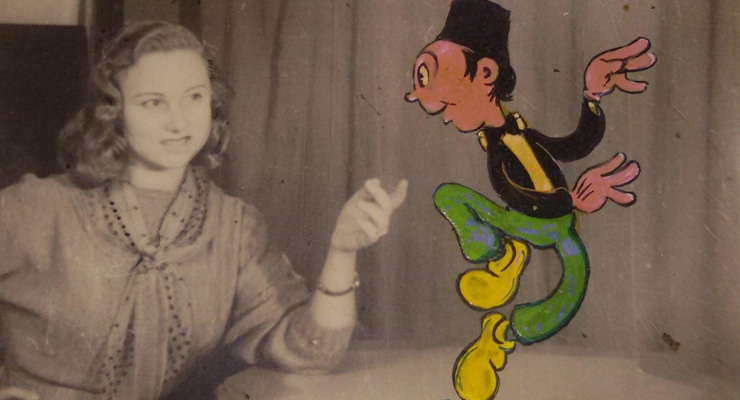
One of the virtues of international film festivals is the opportunity they give movie buffs to see films that, for one reason or another, have not found a distributor that would bring about a commercial release in their neck of the woods. It's a benefit that's particularly appreciated by animation buffs who may be tired of a steady diet of computer generated studio releases predominantly geared at younger audiences.
The 2021 Miami Jewish Film Festival, currently unspooling with a mix of streaming, drive-in and outdoor screenings, has done us animation fans a solid. Whereas most local fests will feature one animated feature and a smattering of animated shorts, the current lineup boasts two features, an entire shorts program and a documentary about a trio of animation pioneers whose story plays like a showbiz cautionary tale.
The ripple effects of war are a striking motif in the three features, making them not just a draw for animation enthusiasts, but a treasure trove for 20th century history buffs. The Spanish Civil War, World War II, the 1948 Arab-Israeli War, the Cold War and life behind the Iron Curtain all figure prominently. More absorbing still are the hidden figures who are finally getting their due. What makes these films worth seeking out? Let's find out.
“Josep”: When the end of the Spanish Civil War solidified Francisco Franco's grip over the entire country, hundreds of thousands of refugees from Catalonia fled to France. They were not met with open arms. Quite the contrary: they ended up in internment camps, facing hunger and illness in deplorable conditions. One of them liked to doodle, even when he didn't have a paper and pencil handy.
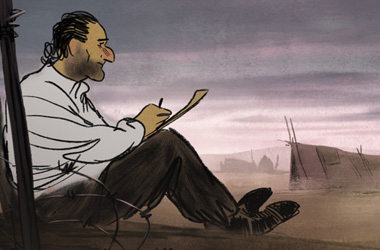
Sergi López (voice of) in a scene from "Josep." Photo courtesy of The Party Film Sales.
But “Josep,” the Spanish-French-Belgian co-production that nabbed Animated Feature Film honors at this year's César Awards, is not a heartwarming tale of triumph over adversity. In its portrayal of cartoonist Josep Bartolí, the film's director, the French cartoonist Aurel, opts for an impressionist approach to the material. It's an inspired choice, because it justifies what could otherwise be construed as a creaky framing device. Rather than adhering to a straightforward narrative, Aurel splinters the chronology into shards of time, seamlessly gliding back and forth between the soul-crushing squalor of the camps, Bartolí's rejuvenating time in Mexico in the mid-1940s, and sequences closer to present day that introduce Valentin (the voice of David Marsais), a French teen who also likes to doodle, his nag of a mother (Valérie Lemercier) and his dying grandfather, Serge (Gérard Hernandez).
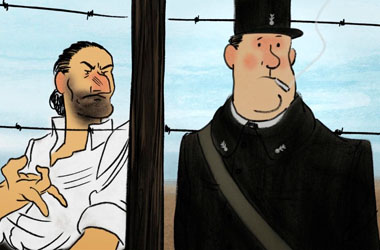
Sergi López and Bruno Solo (voices of) in a scene from "Josep." Photo courtesy of The Party Film Sales.
Ah, yes, the senile, bed-ridden old man who starts babbling to his grandson about his days as a gendarme. The way screenwriter Jean-Louis Milesi presents it, it's through Serge's hazy yet occasionally vivid recollections that we experience the dehumanizing horrors of an internment camp, and the friendship the guard formed, against all odds, with the Catalan artist that his superiors sneered at and treated like dirt. Despite the distancing effect of not having the story told through Bartolí's own point of view, the filmmakers have softened no edges here. Characters hurl f-bombs and racial epithets. It does not look away from death and decay. And when a sexual assault takes place in the shadows, we are not spared the victim's screams.
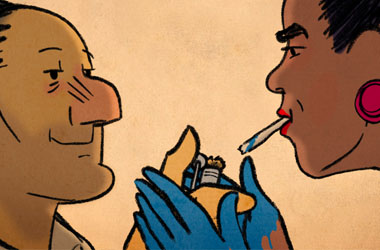
Sergi López and Sílvia Pérez Cruz (voices of) in a scene from "Josep." Photo courtesy of The Party Film Sales.
Aurel adopts a different animation style for each time period. Static images during the prison camp sequences convey Serge's faltering memory, and vibrant colors highlight the Mexico scenes, during which Frida Kahlo makes a brief but memorable appearance. (Kahlo, voiced here by composer Sílvia Pérez Cruz, and Bartolí were lovers during the 1940s.) At the heart of the film are acts of kindness exchanged between Bartolí (Sergi López) and Serge (voiced as a younger man by Bruno Solo). Their bond is endearing without sliding into sentimentality. So it goes for the rest of “Josep,” a triumph of traditional hand-drawn animation in the service of telling a story for grown-ups. If you only have time to watch one film during this year's festival, this touching, exquisitely rendered tribute from one artist to another makes a persuasive case for that coveted spot.
“My Favorite War”: The schoolteacher's first lesson is to extol the value of peace. It's something that must be attained at all costs, the educator stresses. The pupils sit in their desks, red scarves around their necks, as they listen with rapt attention. But minds aren't being opened here. This is an indoctrination. Then the roar of jet engines makes the students look to the window at the planes zooming near campus.
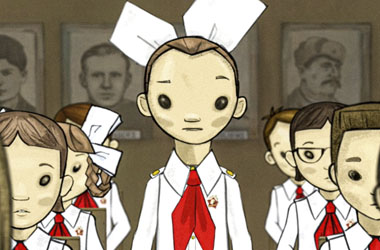
A scene from the animated documentary "My Favorite War." Photo courtesy of Bivrost Film/Ego Media.
The irony of this school day in the late 1970s in the city of Saldus, Latvia is driven home loud and clear in this nonfiction chronicle by writer-director Ilze Burkovska Jacobsen. Billed as an “animated documentary,” the filmmaker's first-person account of life near the northwestern tip of the Soviet Union is at its most compelling when dwelling on mundane details, like the lines she and her mother stood on just to score a stick of butter.
But there's a disparity between the emotional heft of the content and the cut-out animation, which often looks like a scrapbook come to life but features character design that resembles Precious Moments figures with hollowed out eyes. It also doesn't help that the voice actors' line delivery is stiff and robotic and that their faces all look so similar. The characters' herky-jerky, puppet-like movements extend to the narrative structure. It segueways clumsily into sepia-toned flashbacks that go all the way back to World War II, when Ilze's little corner of the USSR was one of the locations where the articles of capitulation were signed in May of 1945.
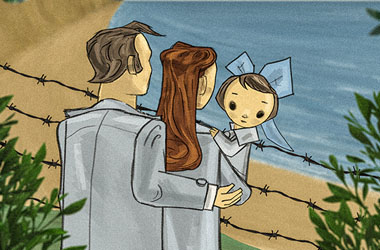
A scene from the animated documentary "My Favorite War." Photo courtesy of Bivrost Film/Ego Media.
But for the people of Latvia, the war never really ended, and under communist rule, they felt like prisoners in their own homes. One of the film's most effective visuals is the sight of Ilze as a toddler standing between her parents as they looked at the beach, forbidden to set foot on the sand. Freedom was always out of reach for her, but it didn't stop her from becoming a model student. “My Favorite War” (the title is a reference to WWII) follows Ilze as her goal of becoming a journalist forces her to choose between toeing the party line and speaking her mind about the injustices she has witnessed. Brief live-action sequences show the adult Burkovska Jacobsen revisiting some of her old haunts and catching up with a close friend from school.
The movie is never less than engaging, but it's also rather muted, despite the tragedies in Ilze's life and the filmmaker's phantasmagoric flourishes. It certainly made an impression at last year's Annecy International Animation Film Festival, where it won the feature-length Contrechamp Award, but to this overgrown animaniac, it's more of a serviceable, respectably somber document that is not always best served by its chosen format and too often feels like a class lecture.
“Tomorrow, When the Apricots Bloom”: The most purely enjoyable title out of this trio isn't even an animated film, but a film about animators. Born into a family of Belarusian Jewish origins, Herschel, Salomon and David Frenkel became the first filmmakers in Egypt to make cartoons, scoring a hit with their character Mish Mish Effendi, whose slapstick-heavy shenanigans were not far removed from early Mickey Mouse but aesthetically hewed closer to the work of Max Fleischer. Think of a Betty Boop cartoon with the Giza pyramids as a frequent background.
But Tal Michael's lean, tightly structured documentary is mostly set in the French home of middle sibling Salomon, where his wife Marcelle still lives and where her son Didier discovered canisters filled with his father and uncles' work. Canisters that, his dad insisted before he passed away in 2001, needed to be destroyed. But why? Why erase the brothers' legacy?
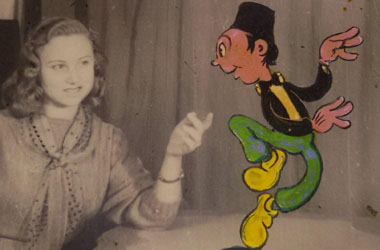
A scene from the documentary "Tomorrow, When the Apricots Bloom." Photo courtesy of Cassis Films.
Therein lies the central mystery, one that Michael digs into with a mix of archival footage and some good old-fashioned eavesdropping on family get-togethers. (The Frenkels love their Scrabble and card games.) What emerges is far juicier than your basic tribute doc: a portrait of a family uprooted from their home, beset by professional failure and haunted by domestic discord. Marcelle, the most reluctant interview subject, ends up being the most fascinating, a matriarch who gave up a lot in order for her husband and his brothers could pursue their dream. Her complicated feelings about their creative output make an already layered film even richer.
Clocking in at a crisp 74 minutes, Michael never lets her film get bogged down in family squabbling. Actually, what's refreshing about it is how cordial Salomon's wife and children remain despite their lingering resentments and painful memories. The film ends with a private screening of the Frenkels' restored films, a payoff made all the more resonant for its modesty. It's a small-scale valentine to the glory and folly of following your movie muse, wherever she may take you.
“Josep” and “My Favorite War” are making their Florida premieres as part of the 2021 Miami Jewish Film Festival. “Tomorrow, When the Apricots Bloom” is making its Miami premiere. All three films are available to stream for free until April 29. For more information, go to miamijewishfilmfestival.org.




